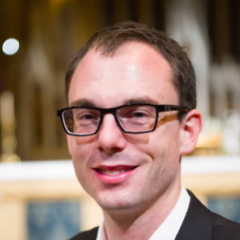The older I get, the more convinced I become that the heart of Mozart’s genius is to be found in his operas. This is no truer than in Don Giovanni, especially when performed by such a talented cast as it was last night in Sydney Opera House, three hours of the most sublime music. I have always believed that great music does not need any gimmicks and should be able to stand on its own. Maybe that was why last night’s production was so refreshing. There was not one scene change in the whole production. There was nothing to distract the listeners, the sole focus being the superb singing and acting happening on stage performed by Opera Australia’s superlative cast.
Don Giovanni is a curious opera. Essentially it tells the story of Don Giovanni’s immorality through his many sexual conquests. The murder of the Commendatore by Don Giovanni leads Donna Anna, the Commendatore’s daughter, to seek revenge, assisted by several other characters, also victims of Don Giovanni’s immorality. His persistent refusal to repent leads ultimately to him being hurled into the flames of hell. Despite the gravity of Don Giovanni’s crimes, the opera almost seems to make light of them, leading some critics to claim that the audience is even on his side. No more is this the case than in the celebrated Catalogue aria, when we are told that Don Giovanni’s conquests in Spain alone number one thousand and three women. The absurdity of this aria almost makes the situation comical. This element was beautifully brought out by Stephen Bennett, playing Leporello.
However, perhaps these comic elements, masterfully portrayed by the production only serve to make the opera’s eventual denouement more powerful. This is the first time the solemn music from the overture returns. It is almost as if we are suddenly brought back to earth with a bang and reminded of the stark reality of the situation. The return of those sombre chords after the statue of the Commendatore knocks at Don Giovanni’s door did nothing less than send a shiver down the spine of last night’s audience. This was accompanied by loud bangs as the pillars of the hitherto untouched set came crashing down. Lightning flashed around the stage as hell itself seemed to envelope the stage and scythe-wielding characters encircled Don Giovanni, before dragging him downwards through a trap door.
Opera Australia’s orchestra was on fine form. As the Overture began the curtain raised to reveal another curtain on which was scrawled the words ‘Don Giovanni 1787’ in case we had forgotten what we had come to see; this was the evening’s only slightly tacky moment. At times during the opera, members of the orchestra appeared on stage dressed in traditional eighteenth century costumes to play the incidental music accompanying the party scenes on stage, adding to the visual feast. There was some excellent harpsichord playing, which accompanied the recitatives with style and panache. The orchestra performed as one all evening, employing beautiful phrasing throughout, imbuing the music with all the character required. The singers responded not only with incredible singing, but with impressive acting, bringing out all of the emotions in a variety of vocal colours. This is the point at which I would normally single out individual singers worthy of special mention, but such was the quality of the cast that it almost seems unfair to do so. For me the singer to watch is Argentinean-born José Carbó, who played the title role of Don Giovanni. He was simply stunning in every respect.


